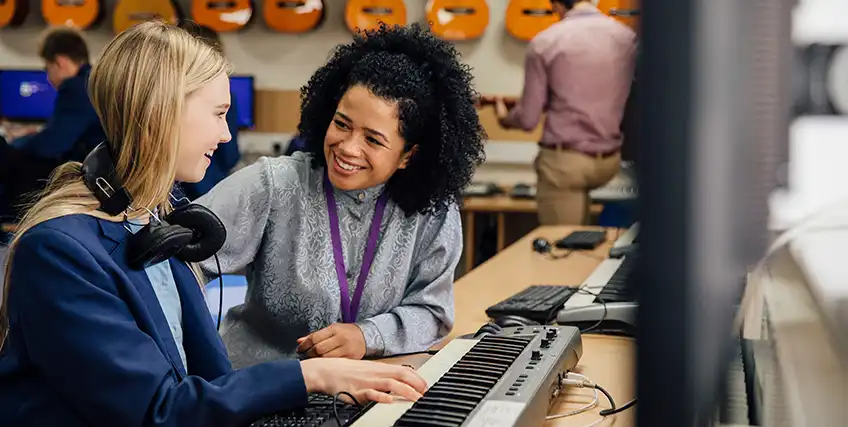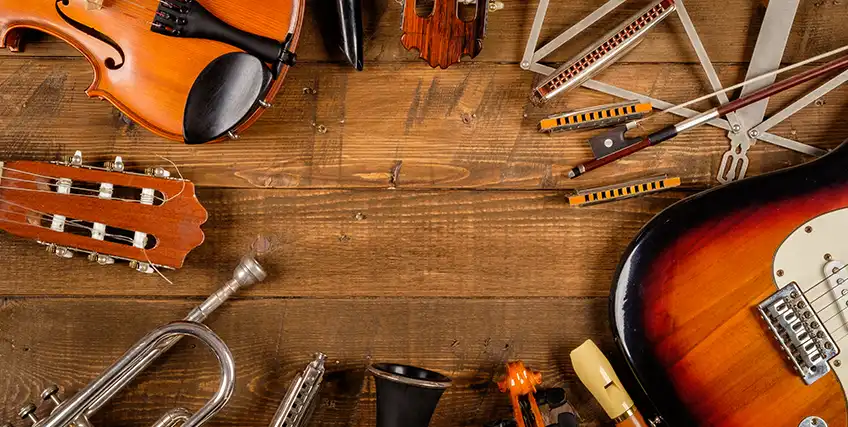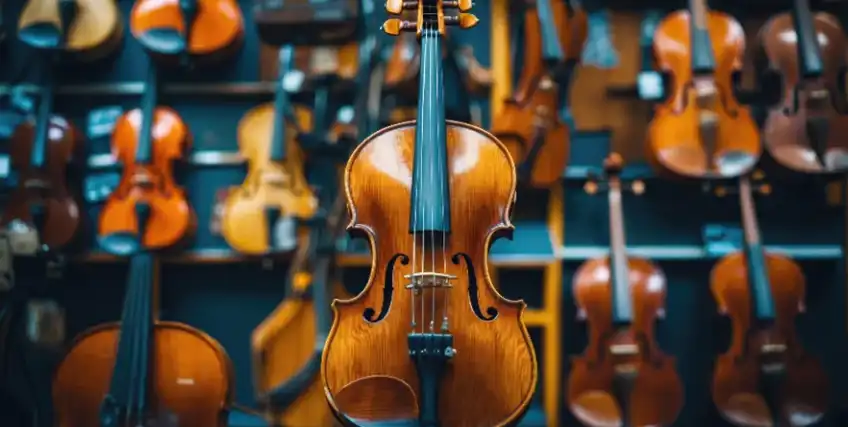How to Finance Music Equipment
April 21, 2025 | Last Updated on: April 23, 2025

How to Finance Music Equipment: A Comprehensive Guide
When you’re passionate about music, investing in the right equipment is crucial to producing quality sound and enhancing your performance. Whether you're a beginner setting up your first home studio or a seasoned musician upgrading to professional gear, financing your music equipment can be a challenge. In this comprehensive guide, we will explore various ways to finance music equipment, helping you understand your options, risks, and the best strategy based on your needs and budget.
1. Finance Music Equipment: Understand Your Needs
Before you start looking for ways to finance music equipment, it’s important to define your requirements. Music equipment financial needs can range from basic instruments like drum financing to complex gear like electronic drum set financing. Understanding what you need versus what you want is essential to creating a feasible budget for your musical instrument loans.
Essential Items:- Instruments (guitar, piano, drums, etc.)
- Audio interfaces
- Microphones
- Studio monitors (speakers)
- Headphones
- Cables and stands
- Recording software (DAWs)
- Soundproofing materials
Once you’ve established your equipment needs, prioritize which items are most important for your music goals. This will help you finance music equipment and ensure that you’re investing in what matters most.
2. Finance Music Equipment: Set a Budget
Setting a clear budget is the foundation to finance music equipment. Determine how much you can realistically afford to spend on equipment, keeping in mind that some items may require more immediate attention than others.
Things to consider:- Upfront costs: Some equipment may require significant upfront costs, such as buying a professional-quality microphone or synthesizer.
- Ongoing costs: Consider recurring expenses, such as software subscriptions (e.g., Adobe Audition, Pro Tools), maintenance, or upgrades.
- Possible maintenance and repair: Instruments and equipment require upkeep, and this should be factored into your overall budget.
3. Save for Music Equipment
If you have the luxury of time, saving for your equipment is one of the safest ways to pay for it without incurring debt. Here are some tips on how to save effectively rather than finance music equipment:
- Set a savings goal: Determine how much you need for each item and set specific savings targets for each. For example, you may want to save $500 for a new microphone over three months.
- Automate savings: Use a separate savings account for your music equipment fund. Set up automatic transfers from your checking account to avoid spending that money on non-essential items.
- Cut back on non-essential expenses: Reduce unnecessary spending in other areas to allocate more funds to your equipment fund. Even small cuts can add up over time.
- Buy used or refurbished equipment: If new equipment isn’t within your budget, consider buying used or refurbished gear. Many musicians find great deals on second-hand equipment from trusted sellers or online platforms.
- No debt: Saving allows you to avoid interest rates and loans.
- No pressure: You can purchase equipment when you have enough funds without worrying about payments or credit.
- Slower progress: It may take time to accumulate enough savings for high-ticket items.
- Opportunity cost: You might miss out on deals or wait longer to start your music production journey.
4. Finance Music Equipment: Use Credit Cards
Credit cards are a common option for financing music equipment, especially for musicians who need immediate access to gear. However, using credit cards comes with both pros and cons.
Advantages of Using Credit Cards:- Convenience: Credit cards allow you to purchase equipment quickly without needing to save up.
- Rewards and cashback: Many credit cards offer rewards, such as cashback or points that can be redeemed for future purchases.
- Introductory offers: Some cards offer 0% interest for an introductory period, allowing you to finance your equipment without paying interest for a limited time.
- High-interest rates: If you don’t pay off the balance within the grace period, you could face high-interest charges.
- Debt accumulation: If you accumulate too much debt, it can negatively impact your credit score, making future financing more difficult.
- Pay off the balance in full: Avoid interest by paying off your credit card balance before the due date.
- Use a card with low APR: Look for credit cards with low interest rates to minimize potential fees.
- Use credit cards for emergencies only: If possible, limit the use of your credit card to essential purchases or emergencies to avoid overspending.
5. Finance Music Equipment: Use Retailers
Many music stores and online platforms offer financing options or a loan on musical instruments. This option allows you to purchase equipment on credit and make monthly payments, sometimes with interest. Retailers often partner with financing companies to offer competitive rates and terms.
Advantages of Retailer Financing:- Low or 0% interest rates: Some financing options offer promotional periods with 0% interest.
- Quick approval process: Retailers often have an easy and fast approval process for financing applications.
- No collateral required: These financing options are usually unsecured, so you don’t need to put up any collateral.
- Deferred interest: If you don’t pay off the balance before the promotional period ends, you could be hit with deferred interest on the entire amount, which can be quite steep.
- Limited to specific retailers: You’ll likely be limited to purchasing from the specific retailer offering the financing option.
6. Personal Loans
If you’re looking for a more substantial loan to finance music equipment, you may consider taking out a personal loan. Personal loans are typically unsecured loans that can be used for a variety of purposes, including purchasing music equipment.
Advantages of Personal Loans:- Fixed interest rates: Personal loans typically offer fixed interest rates, making it easier to budget for monthly payments.
- Larger loan amounts: If you need to finance a larger purchase, a personal loan may be a good option, as it can offer more substantial amounts than credit cards or retail financing.
- Flexible repayment terms: You can choose a loan term that fits your budget, whether you need a few months or several years to repay.
- Loan approval process: Getting approved for a personal loan requires a credit check and a good credit history.
- Interest rates: Interest rates on personal loans can vary depending on your credit score, and they may be higher than retailer financing options.
7. Crowdfund to Finance Music Equipment
Crowdfunding can be a great option for musicians who want to fund their music equipment while also building a fan base. Platforms like Kickstarter, GoFundMe, and Indiegogo allow musicians to raise money by offering rewards or incentives to their supporters.
Advantages of Crowdfunding- No debt: Since you’re raising money from others, you’re not taking on any debt.
- Support from fans: Crowdfunding allows your fans and followers to be a part of your musical journey by helping you fund your equipment.
- Exposure and promotion: Running a crowdfunding campaign can generate publicity for your music project, helping you reach new fans.
- Time and effort: A successful crowdfunding campaign requires a lot of effort, including creating content, engaging with backers, and meeting deadlines.
- Uncertainty: There’s no guarantee you’ll meet your funding goal, and you might not get the full amount you need.
8. Lease Music Equipment
If you only need music equipment for a short period, leasing can be a great option. Many equipment rental services offer the ability to lease instruments or studio gear for a set period, with the option to buy the equipment at the end of the lease term.
Advantages of Leasing:- Lower monthly payments: Leasing typically involves lower monthly payments compared to purchasing outright.
- Access to high-quality gear: Leasing allows you to use high-quality professional equipment that might otherwise be out of your budget.
- Flexibility: You can return or upgrade your gear once the lease period ends.
- No ownership: Unlike purchasing equipment, leasing means you won’t own the equipment at the end of the lease term unless you choose to buy it.
- Total cost: Over the long term, leasing can sometimes be more expensive than buying the equipment outright.
Final Thoughts on How to Finance Music Equipment
How you finance music equipment is a decision that requires careful thought and consideration. Whether you’re saving up for your gear, using credit cards, or exploring loans and financing options, each method has its pros and cons. It's essential to assess your financial situation, credit score, and the amount of equipment you need before making a choice.
Remember to prioritize what equipment you need most and start small if necessary. Don’t forget to shop around for the best financing terms and always be cautious of high-interest rates or long repayment periods that could hinder your financial health.
By carefully planning your financing strategy, you can get the equipment you need without compromising your financial well-being or artistic goals.
FAQs About How to Finance Music Equipment
What is a disadvantage if you finance music equipment through a retailer?
One disadvantage is If you don’t pay off the balance before the promotional period ends, you could be hit with deferred interest on the entire amount, which can be quite steep.
How can you finance music equipment and build a fan base?
One way to finance music equipment is through crowdfunding. It can also be a great option for musicians who want to fund their music equipment while building a fan base.
Can you lease music equipment?
Yes, many equipment rental services offer the ability to lease instruments or studio gear for a set period, with the option to buy the equipment at the end of the lease term.
Can personal loans be used for musical instrument loans?
For a more substantial loan to finance music equipment, you can take out a personal loan. Personal loans are typically unsecured loans that can be used for a variety of purposes, including purchasing music equipment.




